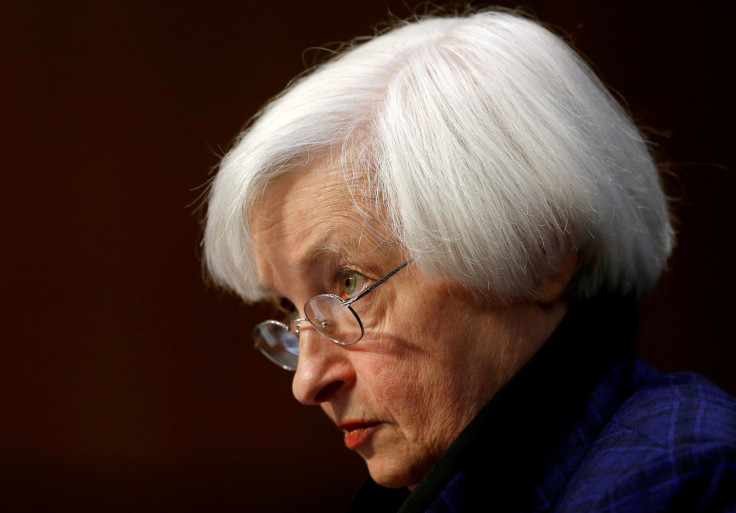Janet Yellen Speech Highlights: Fed Chair Warns Of Uncertainty Under Trump, Hints At Upcoming Rate Hike

Federal Reserve Board Chairman Janet Yellen updated the Senate Banking, Housing and Urban Affairs Committee Tuesday morning on her expectations for the American economy and how the central bank plans to respond to those forecasts in the year ahead. She was scheduled to give a similar semi-annual testimony Wednesday before the House Financial Services Committee.
But until then, read on for some of the most notable highlights of her Tuesday Senate address:
On job growth
"In the labor market, job gains averaged 190,000 per month over the second half of 2016, and the number of jobs rose an additional 227,000 in January. Those gains bring the total increase in employment since its trough in early 2010 to nearly 16 million."
On unemployment
"... the unemployment rate, which stood at 4.8 percent in January, is more than 5 percentage points lower than where it stood at its peak in 2010..."
On the economic disparity between whites and minorities
"Importantly, improvements in the labor market in recent years have been widespread, with large declines in the unemployment rates for all major demographic groups, including African Americans and Hispanics. Even so, it is discouraging that jobless rates for those minorities remain significantly higher than the rate for the nation overall."
On GDP
"U.S. real gross domestic product is estimated to have risen 1.9 percent last year, the same as in 2015."
On the auto industry
"Last year's sales of automobiles and light trucks were the highest annual total on record."
On the decline of manufacturing
"... weak foreign growth and the appreciation of the dollar over the past two years have restrained manufacturing output."
On the housing market
"... housing construction has continued to trend up at only a modest pace in recent quarters. And, while the lean stock of homes for sale and ongoing labor market gains should provide some support to housing construction going forward, the recent increases in mortgage rates may impart some restraint."
On inflation
"Inflation moved up over the past year, mainly because of the diminishing effects of the earlier declines in energy prices and import prices. Total consumer prices as measured by the personal consumption expenditures (PCE) index rose 1.6 percent in the 12 months ending in December, still below the [Federal Open Market Committee's] 2 percent objective but up 1 percentage point from its pace in 2015."
On the U.S. and foreign governments' economic policies
"Among the sources of uncertainty are possible changes in U.S. fiscal and other policies, the future path of productivity growth and developments abroad."
On whether the Fed will raise the interest rate soon
"At its meeting that concluded early this month, the Committee left the target range for the federal funds rate unchanged but reiterated that it expects the evolution of the economy to warrant further gradual increases in the federal funds rate to achieve and maintain its employment and inflation objectives. As I noted on previous occasions, waiting too long to remove accommodation would be unwise, potentially requiring the [Federal Open Market Committee] to eventually raise rates rapidly, which could risk disrupting financial markets and pushing the economy into recession."
On how President Donald Trump could change that
"... changes in fiscal policy or other economic policies could potentially affect the economic outlook. Of course, it is too early to know what policy changes will be put in place or how their economic effects will unfold."
On what Trump needs to do
"While it is not my intention to opine on specific tax or spending proposals, I would point to the importance of improving the pace of longer-run economic growth and raising American living standards with policies aimed at improving productivity. I would also hope that fiscal policy changes will be consistent with putting U.S. fiscal accounts on a sustainable trajectory."
On Trump's executive order mandating that for every new federal regulation, two should be repealed
"I believe that the independent agencies are not covered by the rules... Constantly looking for ways to mitigate [regulatory] burden is an important goal."
On whether she'll finish her final year as head of the central bank under the new administration
"I do intend to complete my term as chair."
On how she'll "deal with" three new Fed governors to be appointed by Trump, as Sen. Richard Shelby, R-Ala., put it
"Of course, we have a diverse membership. It changes over time, and the role of the chair is to work with all the governors to manage the dual mandate we are charged with."
On the Taylor rule, a formula requiring the Fed to change the interest rate directly in accordance with specific changes in the inflation rate
"I believe we would have a much weaker economy if, in the last several years, we followed the dictates of that rule."
© Copyright IBTimes 2024. All rights reserved.












